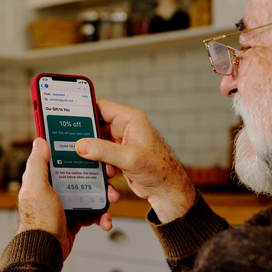Table of contents
Facebook has evolved from a social network used for catching up with old friends from high school and posting photos of your dinner to a powerful marketing and retention tool for businesses. But what companies may not realize is that Facebook is also the number one place where consumers find new businesses.
Fifty-two percent of consumers discovered new businesses on Facebook in the past year, according to our recent survey of 1,800 U.S. consumers that highlights trends on how they discover, choose, and recommend new businesses.
It came in ahead of Google Reviews (43 percent) and Yelp (38 percent) as the channel used by the most consumers. Facebook also outpaced traditional media like local newspapers (14 percent) and magazines (11 percent).
When it comes to Facebook’s audience, the survey found that 56 percent of women and 45 percent of men are using the social network. Seventy percent of millennials use Facebook for discovery, which is more than any other group, including xennials (the generation between millennials and Gen X), who rely more on Yelp, and consumers ages 53 and older, who are more likely to discover new businesses through local newspapers.
By now, most companies with a Facebook presence know that the social network is a useful tool for sharing information, posting photos, and responding to questions and feedback from existing customers. You may not have realized how powerful the platform is as a discovery tool (Facebook did know — hence the recommendation feature they launched last year).
But with this knowledge, you can adjust your approach to Facebook so that you engage not only your current customers, but also your potential customers. Here are a few tips to start:
- Make it easier to find your Facebook page. Make sure you’ve added a category and description so that it’s easier to find in searches.
- Fill out the details. Our survey respondents said they expect to find customer reviews, contact details, and photos on a business’s social profile. If you run a restaurant, they also want to see a menu; if you run a salon, give a breakdown of the services and costs. Don’t forget to add photos, too.
- Make sure you’re posting original content. Because of changes to Facebook’s algorithm, the Newsfeed favors content that a user’s friends and family have actively engaged with — things they’ve reacted to, commented on, or shared. So think about posting unique content that is going to illicit some kind of action from your followers. That will give you the best chance of reaching prospective customers.
- Encourage others to post about your business. In addition, you should encourage your customers to share their experiences with your business and tag your page in their posts. You can do this with a campaign or a contest. Or you can make your space photo worthy — think interesting art, great plating (if you’re a restaurant), or an identifiable feature — and encourage people to post that way.
- Respond to comments. Again, the actions of friends and family take precedence in the Newsfeed. So if someone comments on your page, make sure you respond fairly quickly. Whether it’s positive feedback or negative, prospective customers will see that you are attentive and that you care about customer service. If it’s a negative comment, your response could help stem the impact. (This is important for customers who visit your page.)
- Invest a little money. One way to make sure that your message gets to the right group of prospective customers is to invest in Facebook ads. You can boost an existing post or create an ad (there are different formats, depending on what your goal is). Then you can target your audience based on categories like age, location, and interests.
How to make your business more discoverable online
Of course, Facebook isn’t the only place that consumers discover businesses. To ensure that you’re reaching a wide audience, try to check these things off your list as well:
Update your other social profiles
Think about your target audience and its preferred social media platforms, and focus your efforts there. It’s important that you are active on these platforms. So if you only have the bandwidth to tend to one or two platforms, focus your efforts there instead of having several accounts that you rarely update.
Claim your online review pages
Claim your business pages on Google and Yelp. Fill out these pages with the same information you did on your Facebook page, like address, hours, and phone number. Make sure to include a website link, as 54 percent of consumers almost always or often click website links included in review pages.
Consumers also like to see photos: 69 percent want to see photos of your products or services, while a smaller group (19 percent) wants to see photos of your brick-and-mortar space.
Tend to your online reviews
Once you have your pages all set up, you need to make sure you are monitoring them and responding to reviews. This shows that you are paying attention to your customers and working with them to right any wrongs.
Forty percent of consumers read the most recent reviews first, and 20 percent of consumers look to negative reviews first, so pay close attention to these reviews and quickly engage with unhappy customers.
In your responses to dissatisfied reviews, express your regret and don’t get defensive — the last thing you want to do is further anger the customer, especially on a public platform. (If the review is particularly bad, you might reach out privately and offer a discount or refund.)
Have a website
According to the survey, 85 percent of consumers think that a quality website is important for a business, compared with 91 percent of Gen Zers and millennials, who put more importance on a quality website than other age groups.
In terms of what a business should include on its website, 66 percent of respondents want to see pricing information, while 55 percent want to see a list of the services offered, and 37 percent want to see pictures of the products or services.
Invest in SEO
Not only do you want your business to be optimized for discovery on Facebook, but you want it to rank highly in Google, too, which means you should focus on search engine optimization (SEO). Optimizing your site means creating a strategy (including using the best keywords, meta data, link structure, etc.) that will improve your ranking in search engines and get more traffic to your site.
**Want to see more of the survey results? Download our Retail Playbook: Finding and Winning New Customers.
![]()











